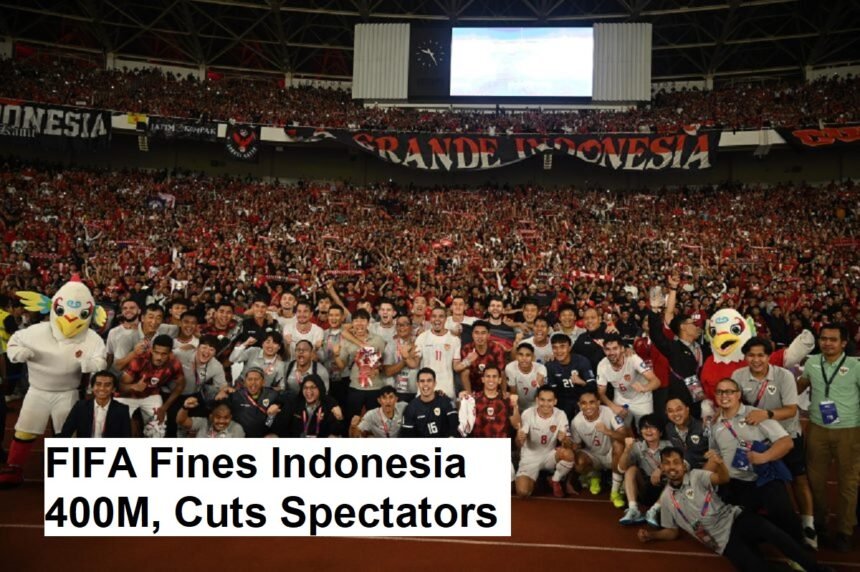On Saturday, May 10, 2025, FIFA officially imposed a disciplinary sanction on the Indonesian Football Association (PSSI), levying a fine of 400 million Indonesian Rupiah and mandating a 15% reduction in stadium attendance for Indonesia’s upcoming match against China scheduled for June 5, 2025. This decision marks a significant moment in Indonesian football, reflecting FIFA’s ongoing efforts to uphold standards of conduct, safety, and fair play in international football events.
The fine and attendance reduction were imposed following a series of incidents and violations linked to previous matches involving the Indonesian national team. While the specific details of the infractions have not been fully disclosed publicly, such sanctions typically arise from breaches of FIFA’s regulations concerning crowd behavior, security protocols, or administrative shortcomings. Common reasons for such penalties include fan misconduct such as the use of pyrotechnics, racist or discriminatory chants, pitch invasions, or failure to comply with safety standards mandated by FIFA.
The 400 million Rupiah fine, equivalent to approximately 27,000 USD, serves as a financial penalty aimed at encouraging the Indonesian Football Association to take stronger measures in managing fan behavior and ensuring compliance with international football regulations. Financial sanctions like this are designed not only to punish but also to incentivize improvements in organizational and security practices ahead of future matches.
In addition to the monetary fine, FIFA’s decision to reduce stadium capacity by 15% for the June 5 match against China is a direct measure to mitigate risks associated with crowd control and safety. By limiting the number of spectators allowed, FIFA aims to create a safer environment for players, officials, and fans alike. This reduction means that if the stadium’s full capacity is, for example, 50,000, only 42,500 spectators will be permitted to attend the match. Such measures are often temporary but carry significant implications for ticket sales, fan engagement, and the overall atmosphere of the game.
The timing of the penalty is particularly sensitive, as the match against China is a high-profile fixture that draws considerable attention from fans and media across Asia. The Indonesian Football Association now faces the challenge of implementing stricter crowd management policies, enhancing security measures, and conducting awareness campaigns to educate fans about acceptable behavior during matches. Failure to comply with FIFA’s directives could result in further sanctions, including larger fines, extended stadium bans, or even disqualification from tournaments.
Reactions from Indonesian football officials have been mixed but generally constructive. The PSSI has acknowledged FIFA’s decision and expressed commitment to addressing the issues raised. In official statements, the association emphasized its dedication to improving fan conduct and working closely with local authorities to ensure that future matches meet international standards. Indonesian football fans, while disappointed by the restrictions, have also shown understanding of the need for safer and more respectful sporting environments.
From a broader perspective, FIFA’s sanctions against Indonesia highlight the global football governing body’s increasing focus on maintaining discipline and safety in the sport. Football matches, especially international fixtures, are not only sporting events but also cultural and social gatherings that require careful management to prevent incidents that could harm participants or tarnish the sport’s reputation. FIFA’s disciplinary framework includes a range of penalties tailored to the severity and nature of violations, from warnings and fines to match suspensions and point deductions.
The Indonesian case serves as a reminder to football associations worldwide about the importance of proactive measures in fan management. This includes investing in adequate security personnel, implementing surveillance technologies, enforcing strict entry controls, and promoting campaigns against violence, discrimination, and other forms of misconduct. The goal is to foster an inclusive and safe atmosphere where the passion for football can be celebrated without compromising safety or respect.
Looking ahead, the Indonesian Football Association will likely use this sanction as a catalyst for reform. By collaborating with FIFA, local government agencies, and fan groups, PSSI can develop comprehensive strategies to prevent future infractions. This may involve training programs for security staff, stricter penalties for unruly fans, and enhanced communication channels to quickly address emerging issues during matches.
In conclusion, FIFA’s decision on May 10, 2025, to fine Indonesia 400 million Rupiah and reduce stadium attendance by 15% for the June 5 match against China underscores the governing body’s commitment to upholding the integrity and safety of international football. While the penalties present challenges for Indonesian football, they also offer an opportunity for growth and improvement. By embracing these measures and fostering a culture of respect and responsibility among fans and officials, Indonesia can strengthen its position in the global football community and ensure that future matches are celebrated in a safe and positive environment.









